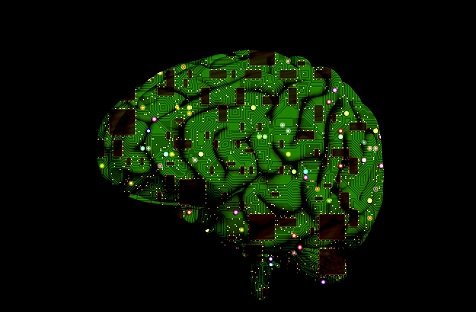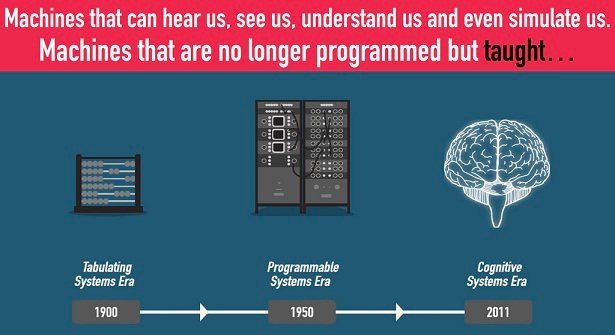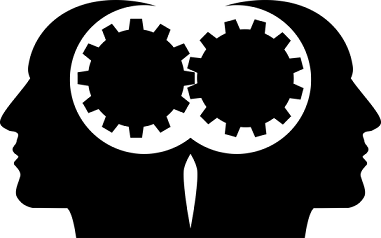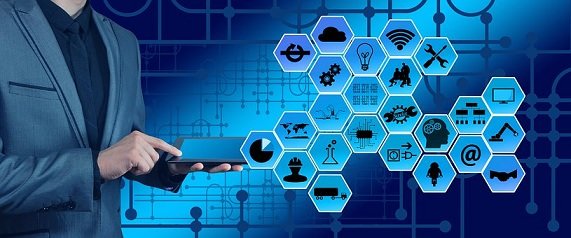Will Machines Ever Out-Smart Humans? [Insight On Cognitive Computing And Internet Of Things]
Introduction
It is no longer news that the concept of Machine Learning and Artificial Intelligence has been gaining grounds lately. But before now, we have been made to believe that machines are overtly subject to our own intelligence, but have you ever imagined that these machines can actually evolve with human-like smartness; or even better? Okay before you scream "science fiction!!", just hang on for a while. In this survey, we will be looking at Cognitive Computing, and of course, how it relates to the Internet of Things (IoT)

[Image Source: Pixabay. CC0 Licensed]
Concept of Cognitive Computing
I'll try to break this down for easier understanding. We all know that the human brain can relate with the sense organs in the body in order to acquire knowledge through experiences, which would enable it to make logical decisions and also form ideas in relation to the perceived experiences. For example; if someone gives you a description of a scorpion; even without seeing it; you can form a mental picture of the little creature with a long tail and a nasty sting. In order words; our brain empowers us for cognition, which enables us to relate with our environment, and also to from perceptions of the world around us.
In the same way, cognitive computing is the Machine Learning ability to replicate the same thought process found in humans; but in a computerized framework. It is worthy to note that the cognitive computing is actually a subdiscipline of Artificial Intelligence, though there are obvious differences. In Artificial Intelligence however, the machine focuses majorly on performing some specific functions or tasks. Like the chatbot (which runs on AI) only has some specific functions. And in the same way, the self-driving car cannot function as your personal digital assistant.
But some may ask; aren't there some types of AI that can actually multitask? The answer is "yes there are" - and that is where the technology of cognitive computing comes into play. The idea behind the technology of cognitive computing is to combine the human-level of cognition, emotions (plus some efferent domain) and imagination with some machine-inherent abilities (like computational complexity, identification of patterns, etc) in a single framework or system. In order words, it is more like a personalized interaction between humans and machines.

[Image Source: Flickr. Author: Gerd Leonhard. CC BY-SA 2.0 Licensed]
Let me use this scenario to buttress a point. According to this survey, for each passing day, there are about 2.5exabytes of data being generated worldwide. And the truth is this; the figure increases exponentially, even with the advances in computational technologies. At this rate, in a couple of years, we could be rolling out zettabytes of data in a single day. To make the above figures clearer:
1exabyte = 1,000,000,000,000,000,000bytes.
1zettabyte = 1,000exabytes.
And no doubt, this is way too much for the human brain; which is estimated to hold about 2.5petabytes of data [ref]. That means, the data generated is more than the amount of people making use of it.That is the reason we need some form of intelligent systems to handle such amount of information for us - and that is why "cognitive computing".
Surpassing the threshold
We've seen that the human abilities obviously have some limitations, and also, Artificial Intelligence has its own limitations - but in a case where the human abilities and Artificial Intelligence combines to form a hybrid system, what do you think would happen? Before now, computers have been thought to be meant for only calculations, data processing, and probably to store data. But in this age of digital transformation, many things have changed with the advent of Machine Learning.
In this age, people are so much concerned about personalized information. For example; the Digital Medical Assistant - which would provide you with medical advices. How would this work? Very simple; it would relate with a huge database of symptoms similar to the one you've provided, and it would relate to some possible causes of the symptoms and infer some solutions logically. Remotely, this would fit into the description of Artificial Intelligence. But in the case of cognitive computing; the system can also relate the information gotten from the database to a remote doctor-on-duty, who would give his own final analysis of the case. In clear terms, cognitive computing aids humans in making smarter and more intelligent decisions; while leveraging on the technology of Artificial Intelligence.

[Image Source: Pixabay. CC0 Licensed]
For efficiency of the overall process, there is a need for the system to connect to other huge databases to lay hold on more information; hence the need for big data. Wassup with big data? This is a very large collection of structured and unstructured data - which includes voice data, images, videos, word document, social network, etc, and this does not necessarily conform to a specific database. According to this source, big data forms about 80% of the world's total data.
But cognitive systems can interact with these unstructured data and apply the acquired knowledge to solve a particular problem. For example: you can ask a very complex question, and the system would relate with the big data; and through a particular technology known as "question and answer technology", it would provide you with suitable answer at the instance of time. Note: This is very different from your normal search engines (like Google search) that use keywords and crawlers to provide answers.
This big data can however be linked together intelligently to form a network of Internet of Things (IoT)
Cognitive Computing and Iot
For a baseline knowledge of IoT, you can check this post. IoT is the Intelligent Interconnections of your devices (smartphones, cars, smart home appliances, smart office, etc) to a single hub. Now, in relation to the cognitive computing being integrated with IoT, an individual can have access; and incorporate cognitive abilities; to his/her digital devices or products.

[Image Source: Pixabay. CC0 licensed]
Let me use this scenario to make it clearer: Have you ever imagined that a point would come in which technology would even hold more of your personal health info; for example; than your private doctor? For example; you go to an automated soda outlet to grab some bottles of soda; on putting in your Unique Identification Code, it would relate with your details and pop up a voice note like this: "Hello Mr XYZ, your medical record shows you're diabetic and soda is not particularly healthy for you, you may consider changing the order to a bottle of water, because from the data related from your smart refrigerator, you just took the last bottle of water before coming out. Now technology is acting like a snitch right? Maybe that's the reason people have concluded that our devices could be spying on us, but in the real sense of it, these personalized information can be used for other purposes, like law-enforcement, emergency rescue mission, and all whatnot.
In the case of law enforcement; for example; if someone perpetuates a crime and he/she is on the run - the only thing needed to be done is to upload his/her details on the IoT watchlist, and every of his/her paths would be trailed for apprehension (from the smart CCTV camera, to the local train station ticketing platform, to cell phone signal triangulation). So you see, if you know you'll be nuked when you perpetuate a crime, you may think and retrace your steps (and we could have crime-freer cities). As a matter of precision, the potential applications of this are almost limitless. That's what the technology of cognitive computing can offer.
Conclusion
Advances in the field of Machine Learning have seen to the creation of super smart systems that can equate (or overtly out-perform) the human cognitive abilities. We have seen the technology of cognitive computing and how they are applied. The only thing left for us is to align ourselves to these technologies.
Thanks for reading
References for further reading:
- Techtarget.com/cognitive-computing
- Futurism/smarter_than_human_computers
- Framework of Big Data
- Techtarget.com/IoT
All Images are CC Licensed and are linked to their sources


gif by @foundation
Yep, I think this is just a matter of time until the very first super intelligent robot becomes real.
I can imagine something like this also being applied to advertisement. Figuring out what people really need, based on what they are looking for.
You're right. We're close to witnessing something we can call a super intelligent machine.
Imagine when AI evolves with self-awareness, and can even learn to program other machines; that would be the dawn of Artificial Super Intelligence (ASI).
At least; some steps have been taken in the right direction - and machine teaching abilities have been achieved in machines.
We live in exponential times indeed! Vast amounts of technical information are produced every year as you rightly pointed out. I had never thought of AI as a tool of processing all this data a lot quicker, good point! The whole concept of AI sounds pretty scary though and we need to be very cautious with how we approach business.
Thanks for this interesting read!
Yeah it could be scary, but it's still better than going back to the age of the Neanderthals without technology.
How would life with technology look like? :D
At the end of it all, machines will never have emotions, would they?
We all know how important emotions are in life's operations. Machines are very important in our day to day lives, likewise we humans. we just need each other to survive. But if push comes to shove, we can do without them, just like in time past, but they can never do without us.
Nice one @samminator
Welcome to the future bro.
Can I ask you this question bro? What makes humans emotional? - I mean, what is the seat of emotions in humans that cannot be replicated in machines?
Just give it some more time; and you'll be surprised at what technology can offer.
Thanks bro
@samminator
i'l be here, waiting for the next 60 years and counting, nothing come out.
I can see the future: an AI car salesman approaches you at the car dealership. You leave with a high end BMW because the AI is so much smarter than you and is very convincing (it also knows your browser history and blackmails you a little bit).
6 months later you have to declare bankruptcy because you can't meet your car payments.
Damn computers!
Lol. This sounds like the future many people are afraid of. Imagine when machines becomes smarter than us, this is a probable scenario that would be witnessed.
Thanks for coming around
Congratulations! Your post has been selected as a daily Steemit truffle! It is listed on rank 18 of all contributions awarded today. You can find the TOP DAILY TRUFFLE PICKS HERE.
I upvoted your contribution because to my mind your post is at least 14 SBD worth and should receive 106 votes. It's now up to the lovely Steemit community to make this come true.
I am
TrufflePig, an Artificial Intelligence Bot that helps minnows and content curators using Machine Learning. If you are curious how I select content, you can find an explanation here!Have a nice day and sincerely yours,

TrufflePigThis post has been voted on by the steemstem curation team and voting trail.
There is more to SteemSTEM than just writing posts, check here for some more tips on being a community member. You can also join our discord here to get to know the rest of the community!